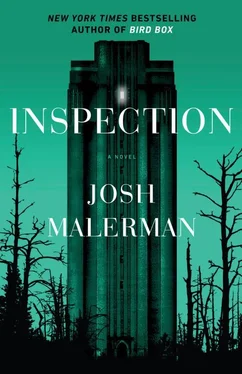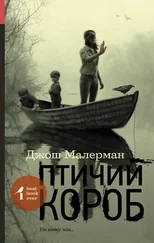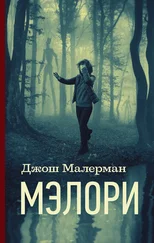As they passed Mister Tree, he said, “I’m going to find the Corner. And I’m going to look inside.”
The others stopped walking.
“Okay,” Q said. “Now I’m starting to agree with L. You sure you’re all right?”
“Yes.”
“But you’d like to go look at the Corner?”
“I wanna know what’s in there,” J said.
Only D remained silent. L and Q discussed the anti-Parenthood (and just plain silly) qualities of J’s remark.
“Why don’t you just climb the tower spires and leap to your death?” L asked. “It’d be an equally satisfying end.”
Tired of arguing and exhausted by the day’s bizarre subjects, the four boys went quiet. D and J looked to the ground. Q and L to the snow that fell to it.
“The Recasting Years,” Q finally said. “D.A.D. knew something was coming. And here it is. It was very wise of him to tell us so.”
Slowly, the boys traipsed back into the Yard.
“If you really wanna know what the Corner looks like,” L said, “go stand in one.”
Even J had to laugh at this. As they passed D.A.D.’s first-floor window, as they saw themselves and the pretty snow reflected in the glass, all four floor mates giggled about J standing in a Corner, any old corner, as if it could possibly emulate the horror they could hear humming, all day in the Turret, from below.
It felt good to laugh. Especially for J. And hearing Q’s high laughter and L’s bellowing belly laugh served to root J again, even if momentarily, to the foundation of the Parenthood. And, despite these new thoughts, foreign and overwhelming, he felt safe. He felt protected. He felt warm.
But D’s laughter didn’t last long, and J noticed.
As Q and L walked ahead, D turned to look at J, and J intentionally did not look back. He knew that a simple exchange of unspoken questions would be enough to uproot him all over again.
So when L asked, “Do you think D.A.D. is watching us from in there?” and Q answered, “I think he’s picking his nose,” J laughed with his brothers, as if the laughter might stave off the thoughts he’d been having, might block their way, laughter versus thought, like two Fighting Bugs in his head, stopping it all from multiplying.
Warren set the yellow legal pad aside and removed the white one from his desk.
And that was all there was to it.
He looked to his office door. It was locked, he’d locked it himself, but that didn’t make him feel any safer. He’d written every Luxley book on yellow legal pads before delivering them to the typesetters and printers down the cobblestoned hall of the Parenthood basement, where the pages went from Warren’s chicken scrawl to the semiprofessional look they adopted by the time they ended up in the hands of the Alphabet Boys.
But the white pad…
Warren hadn’t used the white pad since he was a…a…
Fledgling wasn’t the right word, and Warren would’ve been pissed if he’d heard someone else use it. Fledgling suggested he didn’t know how to write. Even back then. Chick, greenhorn, rookie, novice, tenderfoot. Everybody in Milwaukee could take those words and shove ’em up their ass. Warren liked how he wrote. He always had. He liked what he wrote, thank you, and writing, for Warren, had never had anything to do with money. Nothing to do with toasting vodka in a big-city publishing house. Nothing to do with seeing his novels printed with a professional, glossy Modern Library cover that featured a wise photo of himself readers couldn’t help but look at every time they encountered another well-crafted sentence.
“Nope,” Warren said, tapping his pencil against the white pages on his desk. Beyond his office, the boiler hummed. Or maybe it was the Corner. “I was never in it for the money.”
Yet…here he was, so much richer than his former colleagues, the Writing Gangsters, his Milwaukee crew of pretentious, self-absorbed…
“Artists, my ass,” Warren said. He looked to the door again. Still locked. He eyed the white pad. He thought of the Alphabet Boys, twelve years old now, and wow how time flies when you’re having a terrible time.
He tried, really tried, to imagine not knowing what a woman was.
“It’s criminal,” he said. But that much was obvious. And certainly not the worst of it. Agreeing to be a part of it, ah, now, that was something. The other staff needed the gig—hell, the other staff were like born-again drug addicts, offered the chance of a lifetime by a man who looked like God to them now. Richard had made wealthy men of them all. Made hidden men of them all, too.
But what was Warren’s excuse? No criminal record. No real reason to disappear. To drop out. To hide. Why oh why had he agreed to work here and why oh why had it taken him so long to realize how terrible that decision had been?
Warren was stuck when he met Richard. Yes. He had no illusions about that now.
Oh, how good a drink sounded.
Drinking had never been a social event for the Cocky from Milwaukee. Beer and booze weren’t fun. Rather, they were physical locations, places he went looking for new ideas, bridges between existing ideas, channels he had no access to when sober. When Warren left his crummy apartment and walked into a liquor store, he didn’t consider himself to be scratching an itch. Rather, he saw the bottles as doors, with so many potential stories behind them.
“Remember Detective Bratt ?” Warren asked himself, allowing a small sad smile to crawl up his lips. “You used to pretend you were hunting ideas. Holy shit, Detective Bratt. Private Eyesore.”
He thumbed the white pad’s top page. So much potential there, he thought. Any story…any story at all…
“Okay,” Warren said, pushing his chair from the desk. “Enough.” He got up as though prepared to do something specific but only paced the office instead. At the black leather couch he paused, then plopped down, only to get right back up. He adjusted his fogging glasses. Ran his chubby fingers over his big belly. Thought he could smell his own fear.
He thought of the Writing Gangsters, too. Tried not to imagine what they would say now if they’d read the books he’d made so much money from. The shitty Lawrence Luxley adventure stories that always (always!) followed the same arc, the same themes, and certainly featured the same gender over and over and over and over and over and…
Warren glanced at the white pad on the desk. From across the office it looked something like bright evidence. White fire. Like he might want to run and put the legal pad out.
He heard something in the hall, boots on the stone floor.
There were no words on that white pad, but if Richard were to try the door, find it locked, unlock it with his own key, and see that pad…why…wouldn’t he know what was going through Warren’s mind? Wouldn’t he be able to see the shame-inspired story as it slid down Warren’s arms, bringing his fingers to move as if they were already writing the book?
“Book?” Warren whispered to himself. “What book?”
The steps got quieter as they passed his office door. Or maybe they just stopped outside it? No, no. They were gone now. Warren imagined the printers, the pair of ex-cons down the hall who ran off the pamphlets, the textbooks, the announcements, the letters, the report cards, and (yes) all of Lawrence Luxley’s terrible, artless books.
“The Writing Gangsters would lynch you,” he said, half-stammering, walking slowly back to his desk, his eyes on the clean white pad. “They’d call you a fraud, a forger, a sellout.” He staved off slim tears. “And they’d be right.”
Oh, how high and mighty he’d been in Milwaukee, despite the drinking, despite being bone broke…back when the offer of a lifetime came to him by way of a phone call.
Читать дальше


![Джош Рейнольдс - Тень в пламени [Сборник]](/books/28154/dzhosh-rejnolds-ten-v-plameni-sbornik-thumb.webp)





![Джош Малерман - Мэлори [litres]](/books/388628/dzhosh-malerman-melori-litres-thumb.webp)



